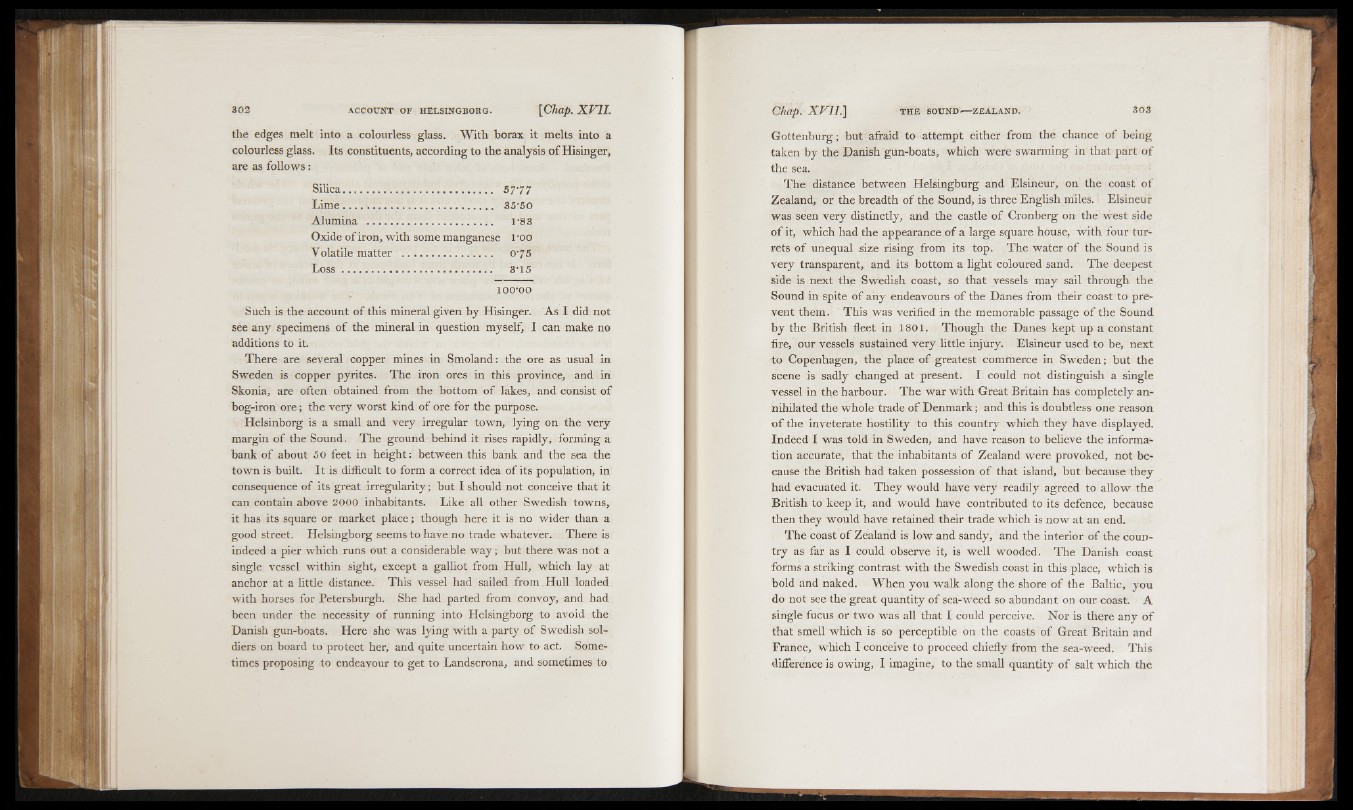
the edges melt into a colourless glass. With borax it melts into a
colourless glass. Its constituents, according to the analysis of Hisinger,
are as follows:
Silica................... 5777
Lime................................................. 35*50
Alumina ......................................... 1*83
Oxide o f iron, with some manganese l*oo
Volatile matter .............................. 0*75
L o s s ................................................. 3*15
100*00
Such is the account of this mineral given by Hisinger. 'As I did not
see any specimens of the mineral in question myself, I can make no
additions to it.
There are several copper mines in Smoland: the ore as usual in
Sweden is copper pyrites. The iron ores in this province, and in
Skonia, are often obtained from the bottom of lakes, and consist of
bog-iron ore; the very worst kind of ore for the purpose.
Helsinborg is a small and very irregular town, lying on the very
margin of the Sound. The ground behind it rises rapidly, forming a
bank of about 50 feet in height: between this bank and the sea the
town is built. It is difficult to form a correct idea of its population, in
consequence of its great irregularity; but I should not conceive that it
can contain above 2000 inhabitants. Like all other Swedish towns,
it has its square or market place; though here it is no wider than a
good street. Helsingborg seems to have no trade whatever. There is
indeed a pier which runs out a considerable w a y ; but there was not a
single vessel within sight, except a galliot from Hull, which lay at
anchor at a little distance. This vessel had sailed from. Hull loaded
with horses for Petersburgh. She had parted from convoy, and had
been under the necessity of running into Helsingborg to avoid the
Danish gun-boats. Here she was lying with a party of Swedish soldiers
on board to protect her, and quite uncertain how to act. Sometimes
proposing to endeavour to get to Landscrona, and sometimes to
Gottenburg; but afraid to attempt either from the chance o f being
taken by the Danish gun-boats, which were swarming in that part of
the sea,'
The distance between Helsingburg and Elsineur, on the coast of
Zealand, or the breadth of the Sound, is three English miles. Elsineur
was seen very distinctly, and the castle of Cronberg on the west side
o f it, which had the appearance o f a large square house, with four turrets
o f unequal size rising from its top. The water o f the Sound is
very transparent, and its bottom a light coloured sand. The deepest
side is next the Swedish coast, so that vessels may sail through the
Sound in spite of any endeavours of the Danes from their coast to prevent
them. 'T h is was verified in the memorable passage o f the Sound
by the British fleet in 1801. Though the Danes kept up a constant
fire, our vessels sustained very little injury. Elsineur used to be, next
to Copenhagen, the place of greatest commerce in Sweden; but the
scene is sadly changed at present. I could not distinguish a single
vessel in the harbour. The war with Great Britain has completely annihilated
the whole trade o f Denmark; and this is doubtless one reason
o f the inveterate hostility to this country which they have displayed.
Indeed I was told in Sweden, and have reason to believe the information
accurate, that the inhabitants of Zealand were provoked, not because
the British had taken possession of that island, but because they
had evacuated it. They would have very readily agreed to allow the
British to keep it, and would have contributed to its defence, because
then they would have retained their trade which is now at an end.
The coast of Zealand is low and sandy, and the interior of the country
as far as I could observe it, is well wooded. The Danish coast
forms a striking contrast with the Swedish coast in this place, which is
bold and naked. When you walk along the shore o f the Baltic, you
do not see the great quantity o f sea-weed so abundant on our coast. A
single fucus or two was all that I could perceive. Nor is there any of
that smell which is so perceptible on the coasts of Great Britain and
France, which I conceive to proceed chiefly from the sea-weed. This
difference is owing, I imagine, to the small quantity o f salt which the